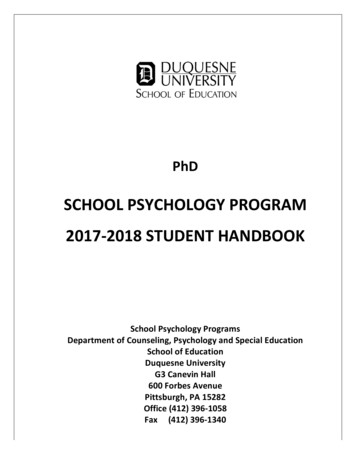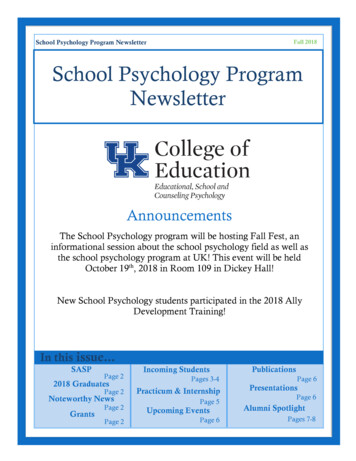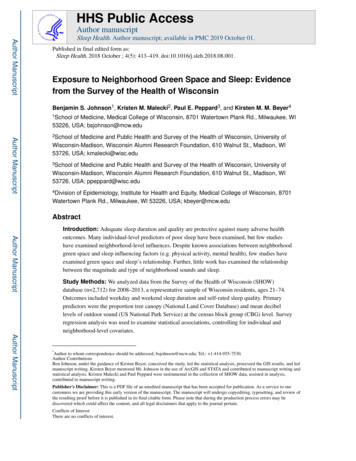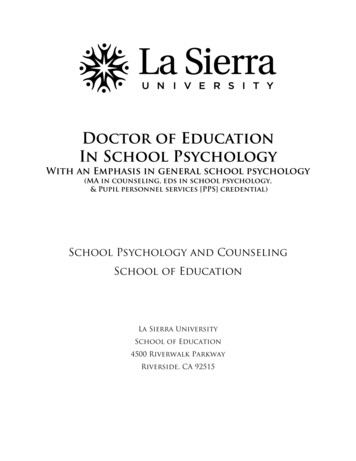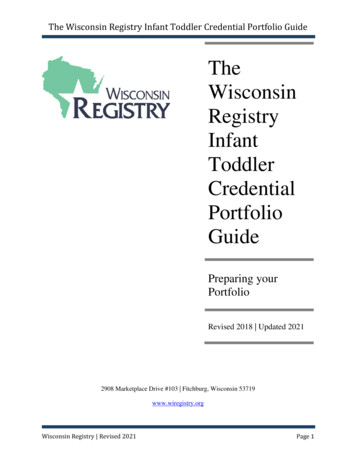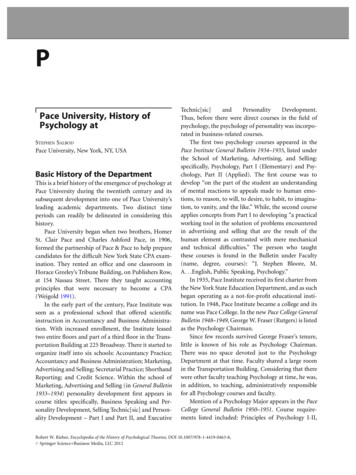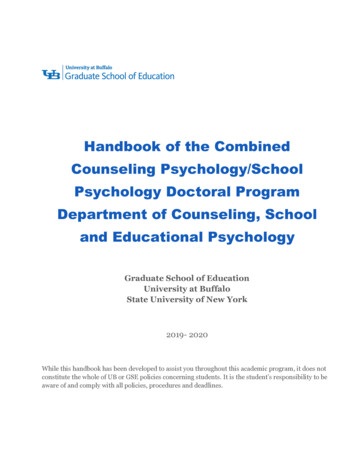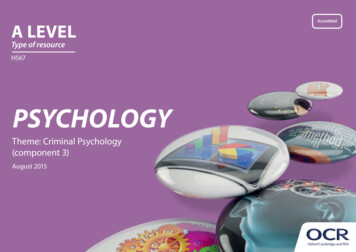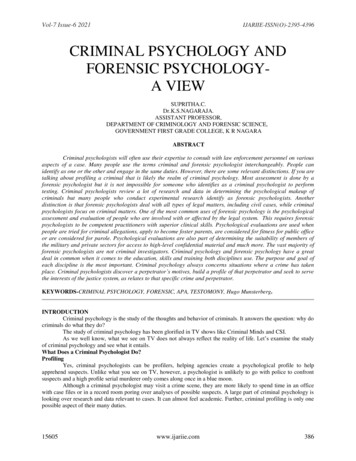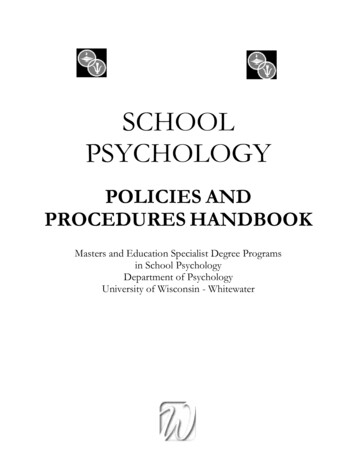
Transcription
SCHOOLPSYCHOLOGYPOLICIES ANDPROCEDURES HANDBOOKMasters and Education Specialist Degree Programsin School PsychologyDepartment of PsychologyUniversity of Wisconsin - Whitewater
TABLE OF CONTENTSPAGE1 . Program Description and Training Model2 .Program Philosophy and Knowledge Base3 . Program Objectives4 . Application and Admission Procedures6 .Course of Study8 .Residency Requirement10 . Evaluation and Retention Policies and Procedures11 . Academic/Professional Standards14 . Advancement to Candidacy for M.S.E.14 . Comprehensive Portfolio Evaluation and Thesis17 . Advancement to Candidacy for Ed.S.19 .Domains of Training Competency29 .Field Experiences31 . Appendices*Sincere appreciation is given to the SchoolPsychology Programs at Illinois State University,University of Northern Iowa, and MiamiUniversity for selected portions of this Handbook.
Policies and Procedures Handbook1SCHOOL PSYCHOLOGY POLICIES AND PROCEDURES HANDBOOKMasters and Education Specialist Degree Programin School PsychologyUniversity of Wisconsin - WhitewaterGeneral Program DescriptionThe graduate program in School Psychology at UW-Whitewater is a three-year, full time course ofclassroom study and field practica and internship leading to certification by the WisconsinDepartment of Public Instruction as a School Psychologist. Students first complete 32 graduatecredits in psychology and education, then either pass a comprehensive portfolio evaluation ordefend a thesis to complete the requirements for the Masters Degree (M.S.E. - School Psychology).Upon attainment of the Masters degree, qualified students enter into the Education Specialist degree(Ed.S.) sequence, consisting of additional credits of advanced course work, a 600-hour fieldpracticum, and a 1200-hour internship. Students may apply for Department of Public Instructioncertification as an Initial Educator – School Psychologist prior to internship. Successful completionof the internship and the ETS Praxis II examination in School Psychology allow the student toapply for the Nationally Certified School Psychologist (NCSP) credential. This certificate isachieving growing recognition among state school psychology licensing boards and allows forreciprocal certification in selected states outside of Wisconsin.The Program has Full approval by the National Association of School Psychologists (NASP), hasadditional accreditation by the Wisconsin Department of Public Instruction (DPI), and is located in aNational Council for Accreditation of Teacher Education (NCATE) accredited unit.Consistent with policies of the University of Wisconsin System, the UW-Whitewater SchoolPsychology Program is committed to equal educational opportunity in its training program andencourages application from all persons regardless of race, color, creed, religion, age, ancestry,national origin, disability, sexual orientation, political affiliation, marital status, Vietnam-era veteranstatus, parental status, and pregnancy.Training ModelThe School Psychology Program at the University of Wisconsin-Whitewater has a distinguishedhistory and current dedication to the professional preparation of school psychologists. The programconforms to the professional scientist-practitioner training model, with a strong emphasis placed onthe maintenance of scientific rigor in the applied setting. Students are trained to see themselves asapplying both the principles of empirical science and the skills of clinical sensitivity and insight tothe problem-solving process in the school setting. While the training essentially represents a"delivery of service" model, students are provided with the curricular background to produce as wellas effectively consume research in the field.The School Psychology Program at the University of Wisconsin-Whitewater subscribes to theconcept of competency-based learning. Students must do more than show academicaccomplishment: They must demonstrate competency in the training areas defined by the Program,the Wisconsin Department of Public Instruction, and the National Association of SchoolPsychologists. This competency is assessed through faculty observation and feedback, a yearlyportfolio review procedure, and through more traditional assessment procedures, including a
Policies and Procedures Handbook2Specialist Research Project, classroom-level examinations, embedded assessments, and the ETS Praxis-IIexamination in school psychology.Program Philosophy/MissionThe philosophical foundation of the Program is grounded solidly in the viewpoint that schoolpsychologists are highly educated mental health professionals able to bring critical reflection, databased decision-making, and applied skills to address complex problems which confront them asschool practitioners. The Program stresses the need for school psychologists to understand thepsychological, socio-cultural, environmental, political, and economic influences that shape thebehavior and potentials of children, families, and school personnel. With this understanding, schoolpsychologists can apply their training as a data-based problem-solver within the school setting,taking a proactive stance in the best interests of children, families, and the individuals who servethem. The future school psychologist also needs to understand the vital influence that the teacher,the classroom milieu, the community, and the educational philosophy of the school have on thechild. Foundational courses in psychology and education, and their associated field practica andinternship combine to provide the student with the opportunity to examine and understand thisecological perspective on human development and functioning.Knowledge BaseConsistent with this orientation, the knowledge base reflects both foundational and applied coursework and experiences in psychology and education. Students are provided with both theoretical andpractical training in a broad range of professional competencies. Core course work in the legal,ethical, and professional foundations of school psychology, human learning, child and adolescentpsychopathology, and measurement theory provide the student with the foundation necessary toadvance to the more applied assessment and intervention curricula and field work. The Programplaces high emphasis upon training school psychologists to be active participants in the resolution ofproblems. Consequently, the knowledge base contains both direct and indirect intervention,including individual and group therapy, behavioral consultation, and primary prevention procedures.In addition, Program students are provided with core professional education requirements in theareas of cultural diversity, pupil exceptionalities, curriculum methods, and reading instructionmethods.
Policies and Procedures Handbook3Program ObjectivesThe School Psychology Program at the University of Wisconsin-Whitewater is designed for thosepersons who plan to devote their professional careers to one of the many aspects of schoolpsychological services and desire to achieve a proficiency which will enable them to assume a role ofleadership based on a considerable depth of understanding in their work. The Program recognizesthat a contemporary training program must prepare its students for the complex challenges oftoday's schools and school children, as well as stimulate their intellectual curiosity and professionalenthusiasm to meet the demands of the future. Consistent with the above philosophy, trainingmodel, and knowledge base, the School Psychology Program has the following training objectives:1. To train individuals who intend to be practicing school psychologists and who will promoteschool psychology as a profession in the highest representative fashion;2. To teach the basic skills and content areas of psychology and education in order to meet therequirements of School Psychology as defined by the National Association of SchoolPsychology, the American Psychological Association, and the Wisconsin State Department ofPublic Instruction Certification for Provisional and (Full) School Psychologists;3. To teach students to have respect for the scientific rigor and principles, which are the hallmarkof the field of psychology at large and the integration of science and professional practice;4. To train students skilled in non-biased, data driven assessment of school-aged children andyouth and to see assessment as integrated with well-researched, measurable treatmentprocedures;5. To train students to become competent in serving as consultants to teachers, parents and otherpersonnel in their work setting and prepared to carry out programs of primary, secondary, andtertiary prevention;6. To train students to become professionals who will act as child advocates and facilitate theoptimal best interest of the child in the environments of school, home and community;7. To train students to become professional school psychologists who are sensitive to andaccepting of human diversity and who are academically prepared for the challenges presented ina pluralistic society;8. To train students to become professionals who will not only be effective consumers of others'research, but as a function of their practice, be able to conduct applied research to benefit thechildren and families whom they serve;9. To provide students with exposure to and understanding of the ethics and values of the schoolpsychology profession;10. To promote in students a need and respect for continuing professional development and toaddress those needs through advanced continuing professional development course work andworkshops.
Policies and Procedures Handbook4APPLICATION AND ADMISSION PROCEDURESAll prospective students desiring admission into the School Psychology Program mustsimultaneously apply for admission into the School of Graduate Studies. Specifics related tocompletion of the application process may be found on the program website athttp://www.uww.edu/gradstudies/schlpsych .Grade Point AverageAn overall undergraduate grade point average of at least a 3.00 (on a 4.00 scale) is required.Applicants who do not meet this requirement may appeal for an exception on the basis of otherfactors (e.g., relevant work experience, outstanding job performance, recommendations, andevidence of appropriate personal qualifications.) Individuals who are accepted with a GPA of lessthan 3.00 will be on probationary status as described in the UW-Whitewater Graduate Bulletin.Prerequisite Course WorkStudents must demonstrate, at a minimum, 12 credits of undergraduate or graduate course work inpsychology which include study in the three areas of (a) child/adolescent psychology ordevelopment, (b) abnormal psychology, and (c) statistics as prerequisite to all graduate course work.Additional preparation in the areas of neuroscience, behavior modification, personality theory, andgeneral or special education are highly recommended.Additional Application RequirementsIn addition to completing the application form from the School of Graduate Studies, students mustalso submit directly to the Coordinator, School Psychology Program, the following:1.A representative sample of the applicant's written expression skills in the form of a typednarrative letter, sent to the Program Coordinator, which includes a discussion of relevantpersonal background and describes in depth why the applicant has chosen to pursue study inthe field of school psychology;2.A completed program application;3.Three letters of recommendation from appropriate persons (such as current/formerprofessors or work supervisors) who are familiar with the applicant’s academic and personalqualifications for graduate study in school psychology, sent to the Program Coordinator;4.The results of the Miller Analogies Test (MAT) or the Graduate Record Examination(GRE), sent to the School of Graduate Studies.Upon review, the Admission Committee may request a personal interview. Admissions may begranted with or without an interview at the Committee's discretion.
Policies and Procedures Handbook5Non-Candidate for DegreeIn accordance with Graduate School policy, students may take selected graduate courses as a NonCandidate for Degree (NCFD) prior to admission. Up to 12 credits may be transferred into thestudent's School Psychology Program upon subsequent admission to the Program. All NCFD creditsmust receive prior approval from the Coordinator.Applicants with Previously Earned Masters DegreesThe UW-Whitewater School Psychology Program accepts in transfer Masters degrees from NASPaccredited school psychology programs, or those school psychology programs whose requirementsmeet or exceed those put forward by NASP. Discipline-related Masters degrees -- e.g., in education,special education, social work, clinical psychology -- may be transferred following a review anddecision by the School Psychology Committee. Substantial additional course work in addition to thatincluded in the Education Specialist degree sequence may be required.Advisement and Supervision in the School Psychology ProgramUpon acceptance, all students in the School Psychology Program are assigned a faculty academicadvisor. The responsibilities of the faculty advisor include:(a)(b)(c)(d)(e)Advising the student in course selection and registration proceduresAssisting the student in orientation to program policies and proceduresFacilitating the student’s orientation to campus resources, such as the library and computerlabsMaintaining regular contact for progress monitoring on at least a semester basisMaintaining availability in a problem-solving capacity such as may be needed by the studentSubsequently within the program, students will be assigned a Specialist Project faculty advisor. TheSpecialist Project advisor must hold Graduate Faculty status in the Department of Psychology.Students enrolled in Psych 793 – Practicum in School Psychology and 795 – Internship in SchoolPsychology are assigned a university supervisor for these experiences. The role of the supervisor isexplained in the individual Handbooks that accompany these field experiences.
Policies and Procedures Handbook6Course of Study in the School Psychology ProgramStudents should consult relevant sections of the Graduate Bulletin for a comprehensive description ofdegree requirements.Graduate Course SequenceStudents in the School Psychology Program complete a total of 32 graduate credits in psychologyand education for the M.S.E., plus additional credits, internship, and research requirements for theEd.S. The following courses are listed in the typical sequence. The three required College ofEducation (see asterisk below) courses may be taken in any sequence at the convenience of thestudent.Masters Degree Typical SequenceSummer IOptional: No more than two (2) College of Education required courses*FallGraduate CreditsPSYCH-620Foundations of Professional School Psychology3PSYCH-715Research Methods and Program AssessmentPSYCH-740Assessment I – Achievement & Progress MonitoringPSYCH-746Psychopathology of Childhood and Adolescence3PSYCH-792Field Placement in School Psychology1PSYCH-724Learning in Educational Contexts3PSYCH-745Assessment III – Intellectual FunctioningPSYCH-770Assessment II - Personality and BehaviorPSYCH-785Advanced Child Development ORPSYCH-787Social Context and Diversity in the School Setting3PSYCH-792Field Placement in School Psychology1PSYCH- 680School Violence and Crisis Management3PSYCH-768Behavior Therapy in the School3PSYCH-762Academic Interventions333Spring33Summer IICollege of Educ. Required Course*3
Policies and Procedures Handbook7Note: Master’s degree awarded upon successful completion of a minimum of 32 credits and successfulcompletion of a comprehensive portfolio evaluation or thesis.Education Specialist Degree Typical SequenceSummerGraduate CreditsCollege of Educ. Required Course*3FallPSYCH-793PSYCH-769PSYCH-797Practicum in School Psychology including Seminar6Consultation and Prevention33Specialist Project Research1College of Educ. Required PSYCH-797SummerPracticum in School Psychology includingSeminar: Cultural diversityCognitive Behavioral TherapynSSocial Context and Diversity in the School Setting choroAdvanced Child DevelopmentolSpecialist Project ResearchsCollege of Educ. Required Course*College of Educ. Required Course*6i33133*College of Education Required CoursesREADING 764SPECED 700EDFOUND 710Developmental Reading in the Elem. SchoolTheoretical Foundations in Special Ed.Education in a Pluralistic Society333Note: Upon successful completion of the 600 hour practicum, a completed Specialist Project, and with aminimum total of 60 approved graduate credits, students may apply to the Department of PublicInstruction for the Initial Educator license prior to internship.36
Policies and Procedures Handbook8InternshipFallPSYCH-795Internship in School Psychology3SpringPSYCH-795Internship in School Psychology3Note: Upon completion of all Program requirements, including Specialist Project, internship, portfolioreview, and the successful completion of the ETS Praxis II in School Psychology, students receive theEducation Specialist Degree.Residency RequirementThe School Psychology Program is designed to be a three-year, full-time course of study. In supportof and encouragement to returning or non-traditional students, modification of the full-timerequirement may be made in the following manner:(a) Full-time enrollment shall mean at least 9 graduate credits;(b) Students must, at a minimum, be in enrolled full-time for two consecutive semesters in Year I(Masters study) or Year II (Education Specialist study);(c) The internship may be completed on a half-time basis over two years.Course WorkAll course work counted toward the completion of either degree must be taken at the graduatelevel. In consultation with the student's advisor, some undergraduate course work may be substitutedfor specific graduate courses, but in no circumstances may the total number of graduate credits bereduced or the required amount of graduate study in an area be reduced by previous undergraduatestudy. At least two-thirds of the student's program must be taken in course work numbered 700 andabove.All students must demonstrate competency through course work, practical experience, and otherlearning strategies in the following areas:I.Data-Based Decision-Making and AccountabilityII.Consultation and CollaborationIII. Effective Instruction and Development of Cognitive/Academic SkillsIV.Socialization and Development of Life SkillsV.Student Diversity in Development and LearningVI.School and Systems Organization, Policy Development, and ClimateVII. Prevention, Crisis Intervention, and Mental HealthVIII. Home/School/Community CollaborationIX.Research and Program EvaluationX.School-Based Practice and DevelopmentXI.Information Technology
Policies and Procedures HandbookCourse LoadA full-time student in good standing may carry a maximum of 14 credits in a regular semester.Summer credits are controlled by extant university policy. Overloads may be granted in unusualcircumstances with the consent of the Program Coordinator and the Dean of Graduate Studies.Transfer of CreditGraduate level work completed at other institutions may be transferred to the University ofWisconsin-Whitewater to apply to a graduate degree. No more than nine (9) credits completed atother institutions may be applied to the M.S.E. - School Psychology degree or the Ed.S. – SchoolPsychology degree. Consult the most current Graduate Bulletin for a complete explanation of thesepolicies. Students wishing to transfer credit must complete the form available at the School ofGraduate Studies Office, at the time of admission to the program.9
Policies and Procedures Handbook10GRADUATE STUDENT EVALUATION AND RETENTION POLICIESAND PROCEDURES*I. PurposeThis policy was developed to provide students and faculty with written guidance regarding thestandards and procedures for continuation in the program and to delineate the procedures used bythe program to (a) evaluate student performance, b) respond to problematic, inadequate, orimpaired student performance, and c) ensure that due process is accorded all parties during theevaluation and review. The formal evaluation policies and procedures outlined in this documenthave been designed to provide:1.students with information about their progress that will enable them to takeadvantage of strengths and/or to remediate weaknesses in academic, professional,and/or personal development.2.faculty with information about the progress of students in order to facilitate decisionmaking that is in the best interests of students and the profession they are preparingto enter.II. RationaleContinuance in the School Psychology Program is contingent upon the ability of the student topursue graduate study. Successful completion of a program in school psychology is based onstudents demonstrating academic, professional, and personal effectiveness related to professionalobjectives. The faculty of the School Psychology Program has a professional responsibility toevaluate the academic, professional, and personal development of students in its trainingprograms. There needs to be a mechanism to address concerns about the suitability of studentsentering the profession. The primary purpose of this assessment is to facilitate academic,professional, and personal growth as well as provide feedback in a timely fashion.III.Due ProcessDue process ensures that decisions made about graduate students by the School PsychologyProgram are not arbitrarily or personally biased. General due process guidelines include:1.2.3.4.5.6.presenting students, in writing, with the program's expectations related to academic andethical functioning;stipulating the procedures for evaluations, including when and how evaluations willbe conducted;articulating the procedures and actions involved in making decisions regarding impairment;instituting a remediation plan for identified inadequacies, including time frame forremediation and consequences of not rectifying the inadequacies;providing a written procedure to the graduate student which describes how the studentmay appeal the program's action;ensuring that graduate students have sufficient time to respond to any action taken by theprogram;
Policies and Procedures Handbook7.8.using input from multiple professional sources when making decisions or recommendationsregarding the graduate student's performance, and;documenting, in writing, the action taken by the program and its rationale.IV.11ReviewAll students are evaluated at least once a year through a formal review meeting of the programfaculty. However, evaluation is an ongoing procedure and questions about a student can be initiatedby any faculty member, practicum supervisor, or fellow student and addressed at any time during theyear as well. When a concern is noted, the student will be notified in writing using theAcademic/Professional Behavior Notification of Concern form (See Appendix A). Followingnotification, the student has five business days to respond by developing an action plan and atimeline for completion (See Appendix A).A. Continuous ReviewStudent review is an ongoing and continuous process. Any faculty member may raise questionsabout a particular student’s performance and progress during regularly scheduled School PsychologyCommittee meetings. Discussions concerning student performance and progress will be held in“closed session.” At that time, any questions about students may be raised for the School PsychologyCommittee to consider.B. Yearly ReviewOnce per academic year, the School Psychology Committee meets formally to review all studentsenrolled in the school psychology programs. At this meeting, the progress of all students is to beassessed. Students will prepare a portfolio to assist the committee in making their decisions.Guidelines for preparation of the portfolio are found in the document entitled “Performance-BasedAssessment in the UW-Whitewater School Psychology Program.” A tentative date for the portfoliopresentations will be announced at the beginning of the first semester. The portfolio must besubmitted by the date specified by the School Psychology Committee (usually at least 10 workingdays before the scheduled review).All students will be provided with written individual evaluations stating strengths and weaknesses asdiscussed by the committee. Students who have not demonstrated satisfactory progress will benotified individually by the Program Coordinator and instructed to make an appointment withhim/her in order to receive feedback and to identify appropriate remediation procedures.V. Academic StandardsA. An average of 3.00 overall grade point is required to maintain good standing as a student inthe School Psychology Program.B. No more than one course with a grade of "C " is allowed toward the completion of theentire Program through the completion of the Ed.S. degree. No grade below a C may beapplied toward the completion of any degree in the Program. No grades of NC (NoCredit) in the Internship are allowed.C.It is the policy of the School Psychology Program that no required Psychology course(PSYCH) may be repeated without a written appeal to the School Psychology Committee.This appeal must address the reasons for the initial poor performance and provide a detailedplan for overcoming those difficulties.
Policies and Procedures HandbookVI.12Professional StandardsStudents are expected to maintain the highest possible academic, moral, and behavioralstandards consistent with individuals training to become mental health professionals. Thefaculty members are committed to modeling that behavior and assisting students who maystruggle in some areas.A. The professional conduct of students in any applied setting, including school buildings,clinics, child care centers, or other educational or mental health facility is guided by thePrinciples of Professional Ethics of the National Association of School Psychologists. Ignorance of anypart of these Principles is not considered an acceptable excuse for violation.B. As a professional in training, all students have an obligation to carry professional liabilityinsurance. Proof of coverage must be provided each year.C. Behavior in the academic setting is guided in part by applicable University of WisconsinSystem Chapter 14 rules. The following behaviors are considered a violation of the policiesof the School Psychology Program:1.being under the influence of illegal substances or alcohol while engaging inany university or field activities related to training as a school psychologist;2.acquiring any new conviction for a felony or misdemeanor or failing to reportany previous conviction at the time of admission. All students within the schoolpsychology program will undergo a criminal background check each year in the program (SeeCriminal Background Check Procedure in Appendix B). In addition, all applicants forWisconsin school psychology positions and those of other states will undergo a criminalbackground check as part of the licensure process. Students who have a criminal record or whoacquire a criminal record while in training should report this information to the Coordinator atthe soonest possible date. This does not apply to non-criminal traffic violations, underagedrinking ordinance violations, or previous violations of the state juvenile code. If in doubt,students should consult the Coordinator, the Department Chair, or their own attorney.3.physically or verbally assaulting or threatening any faculty member, otheruniversity employee, field supervisor, practicum site employee or pupil, orfellow student;4.engaging in sexual behavior with children.5.engaging in inappropriate sexual or sexist or racist behaviors that create a hostilelearning environment for fellow students or faculty;6.falsifying any information on the program application;7.falsifying any information on a practice or authentic situation test protocol,report of field experience, or academic assignment, or in any way knowledgablytolerating that behavior in another;8.public declaration of held beliefs which indicate a clear and unambiguousintent to discriminate as a school psychologist or trainee against personsbecause of race, religion, ethnic origin, sexual orientation, gender, disability,marital status,
accredited school psychology programs, or those school psychology programs whose requirements meet or exceed those put forward by NASP. Discipline-related Masters degrees -- e.g., in education, special education, social work, clinical psychology -- may be transferred following a review and decision by the School Psychology Committee.
